|
|
|
Sort Order |
|
|
|
Items / Page
|
|
|
|
|
|
|
| Srl | Item |
| 1 |
ID:
181928
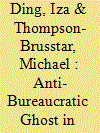

|
|
|
|
|
| Summary/Abstract |
The Chinese Communist Party's (CCP) ideology, rooted in its foundational struggles, explicitly denounces “bureaucratism” (guanliaozhuyi) as an intrinsic ailment of bureaucracy. Yet while the revolutionary Party has blasted bureaucratism, its revolutionary regime has had to find a way to coexist with bureaucracy, which is a requisite for effective governance. An anti-bureaucratic ghost thus dwells in the machinery of China's bureaucratic state. We analyse the CCP's anti-bureaucratism through two steps. First, we perform a historical analysis of the Party's anti-bureaucratic ideology, teasing out its substance and emphasizing its roots in and departures from European Marxism and Leninism. Second, we trace both the continuity and evolution in the Party's anti-bureaucratic rhetoric, taking an interactive approach that combines close reading with computational analysis of the entire corpus of the People's Daily (1947–2020). We find striking endurance as well as subtle shifts in the substance of the CCP's anti-bureaucratic ideology. We show that bureaucratism is an umbrella term that expresses the revolutionary Party's anxiety about losing its popular legitimacy. Yet the substance of the Party's concern evolved from commandism and revisionism under Mao, to corruption and formalism during reform. The Party's ongoing critiques of bureaucratism and formalism unfold in parallel fashion with its efforts to standardize, regularize and institutionalize the state.
|
|
|
|
|
|
|
|
|
|
|
|
|
|
|
|
| 2 |
ID:
099781
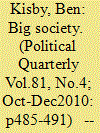

|
|
|
|
|
| Publication |
2010.
|
| Summary/Abstract |
The Prime Minister, David Cameron, recently set out his vision of a 'big society'. Its core themes are empowering communities, redistributing power from the state to citizens and promoting a culture of volunteering. The idea is badly flawed. It overlooks the crucial role that needs to be played by the state in promoting social justice, which is vital to the development of active citizenship and vibrant communities. Moreover, Cameron views the active citizen as simply a philanthropist and volunteer rather than as a politically literate individual, knowledgeable about the major political issues of the day and actively involved in debates about how public or private services ought to be run. The initiative is particularly perverse in the context of the credit crunch, a vitally important cause of which was precisely not the development of an over-mighty state but rather the inadequate state regulation of free market trading activities by banks.
|
|
|
|
|
|
|
|
|
|
|
|
|
|
|
|
| 3 |
ID:
168779
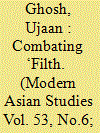

|
|
|
|
|
| Summary/Abstract |
This article interrogates the urbanization of Puri at the time of the cholera epidemic in the latter half of the nineteenth century. In the wake of the epidemic the colonial state took serious steps to reorder the urban landscape of the pilgrim town in general and Puri in particular. However, in Puri the narrative of infrastructural development is slightly complicated by the presence of the temple of Jagannath which acted as an alternative public body. Thus, on every occasion the colonial state had to negotiate with the temple in order to facilitate urban governance in Puri. As a result, I argue, Puri's urban landscape could only develop through interaction and negotiation between the temple and the state.
|
|
|
|
|
|
|
|
|
|
|
|
|
|
|
|
| 4 |
ID:
155091
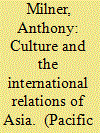

|
|
|
|
|
| Summary/Abstract |
Looking back over the last 30 years, culture as an explanatory factor has been in retreat. Today, however, with the determined reassertion of Islamic values, and an increasingly confident China developing its own international paradigms, the need to investigate cultural and historical specificities is hard to deny. In the Asian region, developments in the South China Sea during 2016 have been especially perplexing for many commentators: International Relations (IR) analysis has come up against a wall of stubborn Chinese and Southeast Asian perspectives. Even some elements in Samuel Huntington ‘civilizations’ approach, widely condemned in the 1990s, today deserve reconsideration – certainly with respect to what Wang Gungwu saw as Huntington's stress on a ‘new language and logic of behaviour’. The common IR analytic framework – highlighting sovereignty, state interests and power (and the balance of power) – needs to be supplemented. Current interest in non-Western IR is promising, especially if it engages in research collaboration with history (particularly the history of ideas, with its focus on close textual analysis). Culture – though certainly in a refined conceptualization – is back.
|
|
|
|
|
|
|
|
|
|
|
|
|
|
|
|
| 5 |
ID:
165242
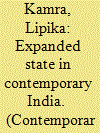

|
|
|
|
|
| Summary/Abstract |
This paper explores the ‘expanded state’ in post-liberalisation India within the context of official responses to the Maoist insurgency in rural central and eastern India. I analyse a scheme called the Prime Minister’s Rural Development Fellowship, which was launched as part of the central government’s attempt to wean ordinary men and women away from Maoist insurgents through rural development. Under this scheme, young women and men are appointed to assist state officials in implementing rural development programmes in districts classified as ‘Left-Wing Extremist’. What does the institution and practice of this fellowship tell us about the state in India today in the context of counterinsurgency and beyond? I address this question on the basis of ethnographic fieldwork in an erstwhile Maoist district in the eastern Indian state of West Bengal. By closely shadowing the everyday work of one Prime Minister’s Rural Development Fellow (PMRDF), I show how the PMRDF is located outside the state, and yet constitutes the state. By focussing on the role of the PMRDF, I reveal one of the many new configurations of the state that are emerging in India today.
|
|
|
|
|
|
|
|
|
|
|
|
|
|
|
|
| 6 |
ID:
167096
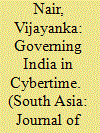

|
|
|
|
|
| Summary/Abstract |
Building on anthropological attention that has been devoted, appropriately, to the question of how states are spatialised, this article analyses how the swirl of discourse and everyday practice around India’s biometric identification programme serves to temporalise the state. The first half of the article examines how the Aadhaar initiative endeavours to assign the temporalising characteristics of innovativeness and expeditiousness to the contemporary Indian state. I show how mobility, change and speed are motivating factors for personnel at the Unique Identification Authority of India (UIDAI). In turn, I argue that Aadhaar is emblematic of the reimagination of the Indian state as a ‘start-up state’, or a lithe platform for innovation. I then explore the ways in which this start-up state is constructed in what one might call ‘cybertime’—a mode of imagining time that unsettles received understandings of historical time. In the second half of the article, I investigate how centralised efforts to temporalise the state are experienced by local implementers of Aadhaar as well as by its targets.
|
|
|
|
|
|
|
|
|
|
|
|
|
|
|
|
| 7 |
ID:
138825


|
|
|
|
|
| Summary/Abstract |
This case study from Malaysia adds a new dimension to critiques of Islamic banking and finance (IBF) by studying various aspects of its agency and showing how its growth complements and sometimes supersedes its spiritual components, resulting in new power alignments. The first significant consequence of IBF has been its global role in an emergent multipolar financial and regulatory global space. Second, by the creation of new alliances and governing classes, it demonstrates a capacity for eschewing the encumbrances of older religious structures and institutions. IBF resonates well within the restructuring agenda of a post-neoliberal global financial order, while reshaping the meaning of religion through a post-secular worldview. Here is where the role of the new agents and authorial voices of Islamic commerce have become crucial in mediating the ethical and material tensions of IBF, acting as the free market reformers of once inflexible doctrines. Thus, the sustainability of IBF hinges upon the empowerment of this new class of secular agents. These agents of IBF find their legitimacy through the seemingly unlikely path of dereligionizing Islamic practices through commerce.
|
|
|
|
|
|
|
|
|
|
|
|
|
|
|
|
| 8 |
ID:
146516
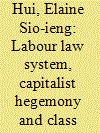

|
|
|
|
|
| Summary/Abstract |
This article investigates how the Chinese labour law system has helped to reproduce capitalist hegemony, i.e. the ethico-political, moral and cultural leadership of the ruling class. Based on intensive fieldwork in the Pearl River Delta and 115 interviews with migrant workers, this article shows that the labour law system has exercised a double hegemonic effect with regards to capital–labour relations and state–labour relations. Through normalizing, countervailing, concealing and transmuting mechanisms, the labour law system has been able to buffer both the market economy and the party-state from workers’ radical and fundamental criticism. However, the double hegemony mediated through the labour law system has influenced the Chinese migrant workers in an uneven manner: some of them have granted active consent to the ruling class leadership; some have only rendered passive consent; and some have refused to give any consent at all.
|
|
|
|
|
|
|
|
|
|
|
|
|
|
|
|
| 9 |
ID:
148272
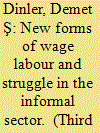

|
|
|
|
|
| Summary/Abstract |
In the absence of formal employment opportunities and with increasing urban and rural poverty, the informal recycling sector has become a means of survival for the past two decades in Turkey. In the capital city, Ankara, the large majority of waste pickers constitute former dispossessed Kurdish farmers who migrated to the city with their families from the southeastern regions as a result of forced migration, and seasonal Kurdish workers who alternate between rural and urban employment. The introduction of new waste management regulations in 2004 made the recycling market a significant area of struggle between local authorities, recycling companies and waste pickers. Local authorities have used these regulations to force waste pickers to sell their waste to certain recycling companies at a price lower than the market price. Waste pickers have reclaimed their right to work in the streets against the violence executed by the municipal police. This paper investigates the ways in which waste pickers should be considered wage labourers and what kind of a moral discourse they have used in making their demands vis-à-vis local governments during the process of intense conflict and negotiation.
|
|
|
|
|
|
|
|
|
|
|
|
|
|
|
|
| 10 |
ID:
149125
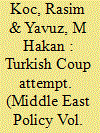

|
|
|
|
|
| Summary/Abstract |
When the Justice and Development Party (AKP) came to power in 2002, it encountered major resistance from state institutions, especially the secularist military, due to its Islamist roots and antisecular rhetoric. In an effort to counter the military and control state institutions, then-Prime Minister Recep Tayyip Erdoğan appointed followers of Fethullah Gülen to key government positions. This administrative support from the Gülen movement enabled the AKP to govern the country and closely monitor the military with the help of the police force. In order to consolidate his reputation as a moderately liberal Muslim leader, Erdoğan endorsed Turkey's joining the European Union, believing that membership in the EU would help grow the economy and build a democratic society.
|
|
|
|
|
|
|
|
|
|
|
|
|
|
|
|
| 11 |
ID:
092036
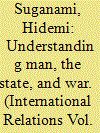

|
|
|
|
|
| Publication |
2009.
|
| Summary/Abstract |
This article expounds and assesses the key contentions of Man, the State, and War. It notes that the book contains meta-theoretical and theoretical components. Through a close re-examination of the text, the article shows how Waltz arrives at his third-image conclusion, reveals a number of errors of a conceptual or logical nature in the meta-theoretical moves that lead him to this conclusion, and explains how such errors are partly rooted in a deeper issue that the book addresses - how to integrate the three images (or three contending estimates of the major cause of war) into one overarching image of world politics based on the agent/structure dichotomy and the distinction between macro and micro enquiries. The article goes on to outline Waltz's substantive theory of international politics, found in an embryonic form in Man, the State, and War, speculates on the sources of the book's success, and assesses its main significance.
|
|
|
|
|
|
|
|
|
|
|
|
|
|
|
|
|
|
|
|
|